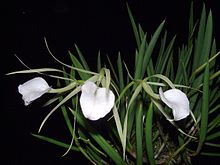Brassavola nodosa
You can help expand this article with text translated from the corresponding article in Spanish. (December 2009) Click [show] for important translation instructions.
|
| Lady of the night | |
|---|---|

| |
| Scientific classification | |
| Kingdom: | Plantae |
| Clade: | Tracheophytes |
| Clade: | Angiosperms |
| Clade: | Monocots |
| Order: | Asparagales |
| Family: | Orchidaceae |
| Subfamily: | Epidendroideae |
| Genus: | Brassavola |
| Species: | B. nodosa
|
| Binomial name | |
| Brassavola nodosa | |
| Synonyms[1] | |
| |
Brassavola nodosa is a small, tough species of orchid native to Mexico (from Tamaulipas south to Chiapas and the Yucatán Peninsula), Central America, the West Indies, and northern South America (Venezuela, Colombia, Guyana and French Guiana).[1][2] It is also known as "lady of the night" orchid due to its citrus and gardenia-like fragrance which begins in the early evening. It has been widely hybridized and cultivated for its showy flowers and pleasing scent.
Scent
[edit]Brassavola nodosa is known for its exceptionally strong fragrance, which is emitted primarily after dark to attract night-pollinating moths. As is typical for moth-pollinated flowers, the scent of B. nodosa is described as "white floral". It is dominated by linalool, benzoates, salicylates, and nerolidol.[3]

Genetics
[edit]The diploid chromosome number of B. nodosa has been determined to be 2n = 40.[4]
References
[edit]- ^ a b Kew World Checklist of Selected Plant Families
- ^ Hágsater, E. & G. A. Salazar. 1990. Orchids of Mexico, pt. 1. Icones Orchidacearum (Mexico) 1: plates 1–100. Asociación Mexicana de Orquideología, México, D.F.
- ^ Kaiser, Roman (1993). The Scent of Orchids. Elsevier. ISBN 0-444-89841-7.
- ^ page 250. Leonardo P. Felix and Marcelo Guerra: "Variation in chromosome number and the basic number of subfamily Epidendroideae (Orchidaceae)" Botanical Journal of the Linnean Society 163(2010)234-278, The Linnean Society of London
External links
[edit] Media related to Brassavola nodosa at Wikimedia Commons
Media related to Brassavola nodosa at Wikimedia Commons
